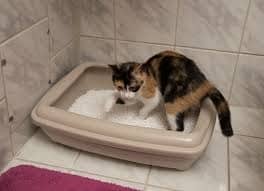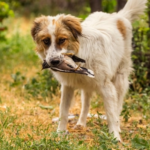Diarrhea can look lots of different ways. It does mean that the gastrointestinal tract is reacting to something (endocrine, endocrine, infectious, parasitic, inflammatory, allergic and cancer).
How diarrhea looks depends on the underlying cause and whether it is from the small intestine versus the large intestine or both.
Whatever the cause, diarrhea is a derangement which results in frequent defecation and often the loss of fluids and electrolytes and in some instances blood.
Color matters
Dark tarry stool is suggestive of an upper gastrointestinal bleed. The dark material you see is digested blood. Working with your veterinarian to find out the cause of this is important as it may lead to or be caused by a life threatening condition.
 Reddish diarrhea suggests undigested blood and means that it is coming from the colon – causes can be certain types of parasites, inflammation, bacterial overgrowth, inflammatory bowl disease and more. In some dogs, if left untreated this can progress to Hemorrhagic gastroenteritis or HGE.
Reddish diarrhea suggests undigested blood and means that it is coming from the colon – causes can be certain types of parasites, inflammation, bacterial overgrowth, inflammatory bowl disease and more. In some dogs, if left untreated this can progress to Hemorrhagic gastroenteritis or HGE.
HGE, but now renamed acute hemorrhagic diarrhea syndrome or AHDS) is a potentially life-threatening intestinal syndrome of an otherwise healthy dog that manifests as sudden onset of bloody, watery diarrhea. The ensuing diarrhea is extremely dehydrating, often much more than might be expected from the amount of diarrhea, and if it is not promptly treated, the dog can go into shock.
Vomiting is often part of the syndrome; in fact 80 percent of patients experience vomiting approximately 10 hours prior to the dramatic bloody diarrhea and about half the time vomiting contains obvious blood. The good news is that with rapid hospitalization and treatment, most dogs recover rapidly.
Age and vaccination status matters
Puppies and kittens require vaccination. In puppies or young dogs that have not finished their vaccination series, parvovirus is a leading cause of diarrhea, which may start off brown but may quickly progress to bloody.
Older dogs that have not been properly vaccinated can also get parvovirus, but it would be very rare to see it in a canine patient over the age of six. Cats can get a form of parvovirus called panleukopenia – in fact, parvovirus is a mutated version of the virus so parvovirus and panleukopenia virus can be contagious to both species.
Why diarrhea matters
Regardless of the cause, diarrhea is an important manifestation of an underlying condition. If left untreated not only can the undiagnosed condition progress but the fluid loss from diarrhea alone can result in significant problems such as dehydration, electrolyte imbalance, malabsorption of nutrients, low blood pressure, organ damage and more.
If your dog or cat is having diarrhea, Urban Animal can help. We have a range of diagnostic tests to see what the underlying cause may be and our facility enables the treatment of most conditions whether as an out-patient or if hospitalization is required.
Houston Heights Emergency Animal Hospital
Urban Animal Veterinary Hospital
1327 Yale St
Houston, TX 77008
(713) 863-0088


